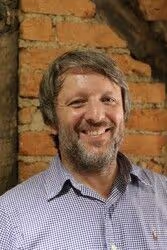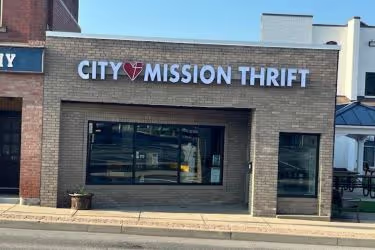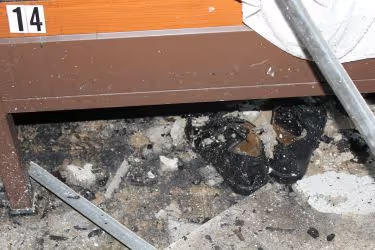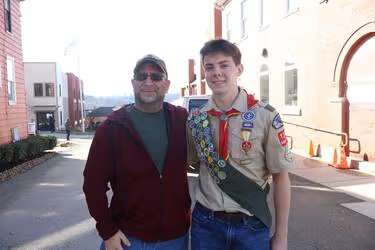A Rising Concern
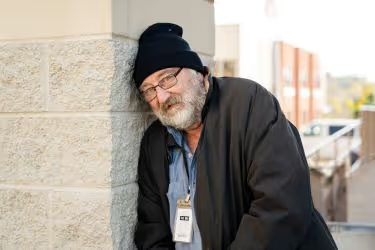
March 17, 2025
In recent years, a startling trend in homelessness has surfaced, and it’s hard to ignore. An increasing number of older adults are finding themselves without a home. In 2024, according to the Department of Housing and Urban Development’s Annual Homelessness Assessment Report, overall homelessness in the United States reached unprecedented levels, spiking by 18% compared to the previous year. Alarmingly, about 20%—or one in every five—of those facing homelessness are aged 55 and older.
“Here at City Mission, we’re seeing an increase in older adults,” said City Mission Director of Residential Programs, Leah Dietrich, “and we have seen it rise over the past 10 years. Over the last few years, we’ve seen an even faster pace of growth.”
Within the past year, 98 individuals aged 55 and over came through our doors as residents, which is approximately 1/3 of our overall resident population. But this rise in homelessness among older adults isn't just a statistic; it's a reflection of deep-seated issues that require immediate action. As we look deeper, the data tell a story of vulnerability, resilience, and a pressing need for change.
Why Are Older Adults Becoming Homeless?
The rise in homelessness among older adults is driven by a combination of complex factors. First, according to the Joint Center for Housing Studies of Harvard University, the US population aged 65 and over soared by 34% over the last decade, and our country is simply not prepared to provide housing, services, and care for this surging population. Additionally, many in this age range are on fixed incomes, which do not match the escalating cost of living, particularly healthcare and housing expenses.
Research from the Joint Center for Housing Studies of Harvard highlights that the cost of long-term care is unaffordable for many seniors, and mortgage debt continues to burden an increasing number of older homeowners—30% of those aged 80 and over still have outstanding mortgages. Also, the median mortgage debt amount for older adults has skyrocketed more than 400% since 1989. “One of the challenges that lead older adults to come to us is lack of family support,” explained Dietrich. “Some have gone through a divorce later in life or have lost a loved one. They might need help managing their medications or taking care of everyday tasks. When their family member or support person leaves or passes away and they have no one left to help them, it can be overwhelming.”
“Some of our older residents, who have worked their whole lives in trades, develop chronic health conditions or sustain injuries so they can no longer work,” added Dietrich. “They end up on a fixed income that simply can’t keep up with rising rent, taxes, and utility costs. One emergency or unexpected expense can lead to homelessness.”
Social factors further complicate matters. Aging can lead to isolation from community and familial networks, worsened by physical mobility issues or chronic health conditions. This isolation makes older adults particularly susceptible to economic shocks and social withdrawal, which can ultimately lead to homelessness.
“Older adults can lose their sense of community,” Dietrich added. “They can become disconnected or isolated due to divorce, loss of a loved one, loss of transportation, or loss of their work community. It’s important for us to restore their sense of community. We become the family they need to help them navigate an ever-changing world.”
Do Not Cast Me Away When I Am Old Scripture urges us to honor and protect our older adults. Psalms 71:9 resonates deeply, reminding us: "Do not cast me away when I am old; do not forsake me when my strength is gone." This scripture highlights our responsibility to ensure the dignity and well-being of the elderly, affirming that they receive the support they need.
The Bible consistently advocates for respect towards the elderly, as seen in Leviticus 19:32, which instructs, "Stand up in the presence of the aged, show respect for the elderly and revere your God. I am the Lord." We are called to be the hands and feet of God to provide care, support, and ncouragement. Through our actions and community efforts, we can embody the biblical ethos of support and respect for our elders, creating a nurturing environment that honors their contributions and upholds their dignity.
Compassionate Care and Life-Changing Programs Addressing homelessness among older adults demands a comprehensive strategy that encompasses both immediate relief and long-term solutions. At City Mission, a Christ-centered rehabilitative shelter, we commit to transforming lives through a range of services including food, shelter, medical services, case management, Biblically-based counseling, and life-changing programs. Our approach is holistic, aiming to restore individuals fully by expressing God’s love in every action.
Our goal is clear: to assist each person who comes to us in moving from crisis to stability. Through our extensive services and community resource connections, we strive to ensure sustained recovery and independence for every individual we serve.
“We work to find community opportunities for our residents,” Dietrich said. “We know what resources are available and have the ability to connect them to what they need. They are looking for a sense of purpose and connection, and we can provide that.”
Right now, we are focused on helping our older adults improve fitness, mobility, and overall health. Every weekday at 12:45, our staff hosts chair exercise sessions to help older adults learn to be active again. Cindy Newman, our Manager of Medical Services, helps our older adult residents navigate through issues associated with chronic health conditions, by helping them manage medications, embrace a healthier diet, make appointments with specialists, and understand the impact a diagnosis can have on their everyday lives. For our older adult residents, we are also focused on offering financial training and digital education. Volunteers come to the Mission regularly to provide budgeting classes and to answer in-depth questions that help our older residents feel confident making decisions that will restore them to independent living. We also offer computer training that helps older residents feel safer online and builds confidence as they navigate online banking, book medical appointments, and rebuild relationships with estranged friends and family, online at first, which can springboard into meaningful and fulfilling reconnections.
“Our youngest residents and our oldest residents break my heart the most,” said Dietrich. “No 19-year-old and no 90-year-old should be homeless. People who outlive their family members who were taking care of them and now are without a home and a support system -- we have to do everything we can to help them!” How You Can Help City Mission
City Mission remains steadfast in its commitment to helping older adults regain stability and dignity. Here’s how you can contribute to this cause:
• Donate: Financial contributions support critical services such as healthcare, shelter, education, and food.
• Volunteer: Your time is a valuable asset. Assisting with daily operations or engaging directly with residents can make a significant difference.
• Advocate: Raise awareness about the challenges faced by homeless older adults. Sharing information, educating others, and advocating for policy changes are powerful ways to help. Join City Mission in the Fight Against Homelessness Addressing homelessness among older adults in Washington, PA, requires a committed and collective effort. By engaging in immediate actions, supporting long-term solutions, and educating ourselves and our community, we can effect meaningful change. Let’s unite to build a supportive and inclusive environment for every member of our community, reflecting the biblical principle of extending a hand to those in need, just as we are guided by our faith to support and uplift each other in times of need. Join us in making a difference. You can also send donations to the following address: 84 W. Wheeling Street, Washington, PA 15301. For more details on donations or if you have any questions, feel free to call us at (724) 222-8530.

